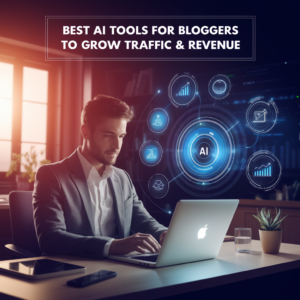AI Agents: Every Business Needs to Skyrocket Efficiency and Cut Costs
Picture a scenario where AI agents are working tirelessly around the clock, revolutionizing how businesses operate in ways previously confined to science fiction. This transformative technology isn’t just about the basic generative AI tools that have become commonplace in our daily operations. Instead, I’m exploring a more sophisticated realm where artificial intelligence performs complex, high-level tasks traditionally reserved for highly-paid corporate professionals – but with unprecedented speed, accuracy, and cost-effectiveness. The implications of this technology stretch far beyond simple automation, representing a fundamental shift in how businesses can operate and compete in today’s market.
The concept reminds me of the remarkable capabilities displayed by Data in Star Trek, who could instantly analyze complex situations and provide strategic recommendations to Captain Picard. But this isn’t science fiction anymore. The future has arrived, and it’s evolving at an astronomical pace. What makes this particularly exciting is how AI agents are democratizing access to sophisticated business intelligence and operational capabilities that were once the exclusive domain of large corporations with substantial resources.
We strongly recommend that you check out our guide on how to take advantage of AI in today’s passive income economy.
Table of Contents
Understanding AI Agents: The Digital Workforce Revolution
Mark Zuckerberg’s vision for AI agents highlights their transformative potential in ways that few other technologies have achieved. He emphasizes how businesses can quickly deploy these intelligent systems to handle customer support, sales, and communication with minimal setup. Just as every business today needs a website and social media presence, Zuckerberg predicts that AI agents will become an essential component of business infrastructure, potentially serving hundreds of millions, if not billions, of small businesses worldwide. This prediction isn’t just aspirational – it’s based on the remarkable capabilities these systems are already demonstrating in real-world applications.
These AI agents represent a revolutionary advancement that local businesses and agencies can leverage to gain a significant competitive advantage. The technology’s sophistication and capabilities extend far beyond basic automation, offering intelligent, adaptive solutions that can transform business operations. What’s particularly remarkable is how these systems can learn and adapt over time, becoming increasingly effective at handling complex tasks and decision-making processes.
The Technical Foundation of AI Agents
According to Amazon’s definition, AI agents are sophisticated software programs capable of environmental interaction, data collection, and autonomous task execution to achieve predetermined objectives. While humans set the goals, these AI agents independently determine the optimal actions required to accomplish them. This autonomy represents a fundamental shift from traditional automation systems, which typically follow rigid, predetermined pathways.
This distinction is crucial because it transcends simple automation. Instead of merely following predetermined workflows, AI agents can adapt to changing circumstances, learn from experience, and develop innovative solutions to challenges. This adaptability makes them particularly valuable in today’s rapidly changing business environment, where flexibility and quick response times are essential for success.
The Core Components of AI Agent Operations
The operational framework of AI agents involves several sophisticated processes that work together seamlessly to create powerful business solutions. First, they perceive their environment by gathering information from various sources, including web data, social media trends, and internal business metrics. This environmental awareness forms the foundation for their decision-making capabilities and allows them to maintain a comprehensive understanding of the business landscape.
Next, these AI agents process inputs by organizing and preparing data for analysis, creating comprehensive knowledge bases that inform their actions. Their decision-making process utilizes advanced reasoning techniques, combining logic and statistical analysis to make informed choices based on their established knowledge and objectives. This sophisticated processing capability allows them to handle complex situations that would typically require significant human intervention.
Real-World Applications and Impact
Consider how AI agents can revolutionize product development and market analysis in ways that were previously impossible or prohibitively expensive for smaller businesses. For a clothing retailer, these intelligent systems can simultaneously monitor social media trends, analyze competitor strategies, and cross-reference sales data to identify promising new product opportunities – all without human intervention. This level of market intelligence would typically require a team of analysts and significant resources, but AI agents can perform these tasks continuously and with greater accuracy.
In the realm of pricing optimization, AI agents demonstrate remarkable capabilities that can directly impact a business’s bottom line. Take a local electronics store, for example. These digital employees can continuously monitor competitor pricing and market conditions, automatically adjusting prices to maintain competitiveness while maximizing profitability. This dynamic pricing capability ensures that businesses never leave money on the table while remaining competitive in their market.
Operational Excellence Through AI Integration
One of the most impressive aspects of AI agents is their ability to optimize business operations across multiple dimensions simultaneously. From supply chain management to technical troubleshooting, these systems can identify inefficiencies and propose solutions that might escape human notice. Their ability to process vast amounts of data and identify patterns makes them particularly effective at finding opportunities for improvement that humans might miss.
For manufacturing businesses, AI agents can transform logistics management in ways that directly impact the bottom line. By analyzing supply chain data in real-time, they can identify potential disruptions before they occur and suggest alternative suppliers or shipping routes to maintain operational efficiency. This proactive approach to supply chain management can help businesses avoid costly disruptions and maintain customer satisfaction.
The Evolution of AI Workplace Integration
The qualities we value in human employees – autonomy, perception, reasoning, and communication skills – are mirrored in advanced AI agents, but with capabilities that extend far beyond human limitations. This parallel enables these digital workers to integrate seamlessly into existing business processes while offering enhanced capabilities that complement human workers. The synergy between human creativity and AI efficiency creates a powerful combination that can drive business success in ways previously unimaginable.
Types of AI Agents for Business Implementation
Goals-based agents represent the first category of AI employees particularly relevant to local businesses and agencies. These sophisticated systems leverage extensive data analysis and natural language processing to achieve specific objectives within defined contexts. What makes them particularly valuable is their ability to understand and adapt to the unique needs of each business, providing customized solutions that drive real results.
These AI agents can handle complex customer interactions, analyze market trends, and even predict future business opportunities with remarkable accuracy. By processing vast amounts of data and identifying patterns that might escape human notice, they can provide insights that drive better business decisions and improve operational efficiency.
The Power of Utility Agents
Utility agents form the second category, serving as the backbone of key business operations. These AI employees can handle complex tasks like competitive price analysis and staff scheduling optimization, similar to human analysts and managers but with greater efficiency and consistency. Their ability to process vast amounts of data and make real-time adjustments makes them invaluable for businesses looking to optimize their operations.
These agents excel at handling routine but complex tasks that require constant attention and quick decision-making. For example, they can manage inventory levels across multiple locations, adjust pricing strategies in real-time based on market conditions, and optimize resource allocation to maximize efficiency. Their ability to operate continuously without fatigue or error makes them particularly valuable for businesses that need to maintain constant oversight of critical operations.
The Future of Autonomous AI Employees
The third and most advanced category comprises autonomous AI agents, representing the cutting edge of artificial intelligence in business applications. These sophisticated systems can independently decompose complex tasks, establish sub-goals, and learn from experience to achieve primary objectives. They essentially function as expert business process consultants, capable of determining and executing optimal strategies for any given task.
What makes autonomous AI agents particularly remarkable is their ability to learn and improve over time. As they encounter new situations and challenges, they build upon their existing knowledge base to develop more sophisticated solutions. This continuous learning process means that their value to the business increases over time, making them an increasingly valuable asset.
Integration and Implementation Strategies
Successful implementation of AI agents requires careful planning and a clear understanding of business objectives. Organizations need to identify specific areas where AI agents can provide the most value and develop strategies for integrating them into existing workflows. This process often involves:
Understanding the current business processes and identifying areas where AI agents can provide the most significant improvements. Developing clear objectives and success metrics for AI agent implementation. Creating a framework for monitoring and evaluating AI agent performance. Establishing protocols for human oversight and intervention when necessary.
The Economic Impact of AI Agent Integration
The financial benefits of implementing AI agents extend far beyond simple cost reduction. While these systems can certainly help reduce operational expenses, their real value lies in their ability to identify and capitalize on opportunities that might otherwise go unnoticed. They can help businesses optimize pricing strategies, improve customer satisfaction, and identify new market opportunities.
Moreover, AI agents can help level the playing field between small businesses and larger competitors. By providing sophisticated capabilities at a fraction of the cost of traditional solutions, they enable smaller organizations to compete more effectively in increasingly competitive markets.
Conclusion: Embracing the AI Agent Revolution
The integration of AI agents into business operations represents a fundamental shift in how organizations can operate and compete in the modern marketplace. These sophisticated systems offer unprecedented opportunities for efficiency, cost reduction, and competitive advantage, making them an essential tool for businesses looking to succeed in an increasingly digital world.
As we look to the future, it’s clear that AI agents will play an increasingly important role in business success. Organizations that embrace this technology now will be better positioned to compete and thrive in an evolving marketplace. The key to success lies in understanding how to effectively integrate these powerful tools into existing business processes while maintaining the human elements that are essential for long-term success.
The future of business operations lies in the seamless collaboration between human creativity and AI efficiency. As these technologies continue to evolve, their integration into business processes will become not just an advantage but a necessity for sustainable success in the modern marketplace. The time to embrace this transformation is now, as early adopters will gain significant advantages in their respective markets.

We strongly recommend that you check out our guide on how to take advantage of AI in today’s passive income economy.




